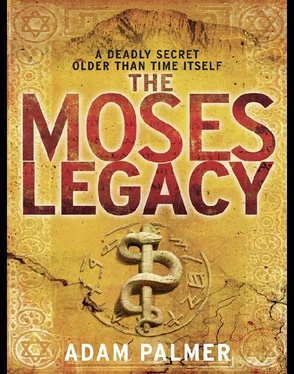Adam Palmer - The Moses Legacy
Здесь есть возможность читать онлайн «Adam Palmer - The Moses Legacy» — ознакомительный отрывок электронной книги совершенно бесплатно, а после прочтения отрывка купить полную версию. В некоторых случаях можно слушать аудио, скачать через торрент в формате fb2 и присутствует краткое содержание. Жанр: Триллер, на английском языке. Описание произведения, (предисловие) а так же отзывы посетителей доступны на портале библиотеки ЛибКат.
- Название:The Moses Legacy
- Автор:
- Жанр:
- Год:неизвестен
- ISBN:нет данных
- Рейтинг книги:4 / 5. Голосов: 1
-
Избранное:Добавить в избранное
- Отзывы:
-
Ваша оценка:
- 80
- 1
- 2
- 3
- 4
- 5
The Moses Legacy: краткое содержание, описание и аннотация
Предлагаем к чтению аннотацию, описание, краткое содержание или предисловие (зависит от того, что написал сам автор книги «The Moses Legacy»). Если вы не нашли необходимую информацию о книге — напишите в комментариях, мы постараемся отыскать её.
The Moses Legacy — читать онлайн ознакомительный отрывок
Ниже представлен текст книги, разбитый по страницам. Система сохранения места последней прочитанной страницы, позволяет с удобством читать онлайн бесплатно книгу «The Moses Legacy», без необходимости каждый раз заново искать на чём Вы остановились. Поставьте закладку, и сможете в любой момент перейти на страницу, на которой закончили чтение.
Интервал:
Закладка:
They had arrived at the entrance to the valley. Gabrielle spoke from the back of the jeep.
‘You know, the best way to see this valley is on foot. It has some wonderful rock formations around the narrow paths that you can’t get to by car.’
‘I don’t think our friend could take the heat,’ Mansoor replied with a mocking smile, applying the brakes.
‘Then why are we stopping here?’ asked Gabrielle.
‘We have to get the guardian to open the tomb,’ Mansoor explained. ‘Let’s hope he’s at home.’
The three of them stepped out of the jeep and into the silence of the western Valley of the Kings. But this time, the blast of dry heat that hit Daniel was not quite as oppressive as it had been before. What was disconcerting, however, was the desolate loneliness that hung in the air around them. This, Daniel realized, was the sensation that the old adventurers must have felt in the main valley when they first explored and excavated the area, before it was transformed into the tourist beehive that it had now become.
Mansoor looked around, as if this were new to him also, and then started walking towards the guardian’s house at a snail’s pace.
‘The ancient Egyptians believed that the valley was watched over by Meretseger, a local goddess whose name translated, appropriately enough, as “She who loves silence”. But there was a bit of a pun in her name, because the first syllable, Mer, was also the first syllable of the word for pyramid and the goddess was said to dwell in the pyramid-shaped mountain that overlooked the valley. To the ancient Egyptians she was perceived as both kind and cruel – the dispenser of both favours and pain.’
‘Perhaps the archetype for women ever since,’ added Daniel with a teasing smile in Gabrielle’s direction. She did not look amused.
Mansoor stopped in front of the door to the old shack and knocked aggressively.
From within the house, Daniel heard a deep baritone voice mumbling in Arabic about the world surely not coming to an end and how the visitor was making enough noise to arouse the pharaohs from their eternal slumber.
The door opened with a clanging of chains and a clacking of bolts, as the gravel-voiced grumbling continued. But it came to an abrupt end when the diminutive, wizened guardian of the tomb came face to face with Mansoor. In the polite Arabic exchange that followed, Mansoor explained without introducing himself that he and his guests had come to see Tomb 23.
The guardian went back into the house and returned seconds later with a huge bunch of oversized keys. When they went back to the car, it was clear from Mansoor’s body language that he wanted the guardian of the tomb to sit in the front with him, in deference to his age. So Daniel joined Gabrielle in the back, greeting her with a smile. After holding out for a second or two, she reciprocated. Daniel sensed that her sombre mood was due in no small measure to the way in which she was being squeezed into the background, as Mansoor and Daniel engaged in their detailed discussions, despite the fact that she was academically on a par with them. It was as if all the old Middle Eastern stereotypes about women were coming into play.
Mansoor restarted the jeep and drove slowly along the increasingly narrow and rock-strewn track. Along the way he stopped by an old brick hut, but kept the engine running. The guardian of the tomb got out and went over to the hut, opening it and disappearing inside, mumbling something inaudible in Arabic that could have been a curse, but was more probably just a lament at having his daily routine interrupted. After a few moments, there were clanking noises, as if things were being moved about inside, then silence.
A second or two later, the silence of the valley was broken by the whirring drone of a generator. In an instant, the valley had lost its tranquillity as the incessant rumbling permeated the air around them, not as noise, but as a faint background sound. The guardian emerged, locked up and strolled at a leisurely pace back to the jeep. No matter how much of a hurry the others were in, he was going nowhere fast in this heat.
The drive that followed seemed to last an eternity. Daniel couldn’t imagine what it would have been like to walk it, especially in this midday heat – the worst possible time to be doing this. And when Mansoor finally pulled up and they all got out of the jeep, it was clear that there was still a distance left to walk.
‘The tomb we are about to visit,’ Mansoor explained, ‘is one of only four in this part of the valley. These are all tombs that are in one way or another associated with the Amarna period.’
Mansoor was referring to the brief period between 1341 BC, when Akhenaten moved his court to the purpose-built city, and 1331 BC, when his son, who was then called Tutankhaten, ended the religious reform, restored the cult of Amun and moved the capital back to Thebes. To signify the end of his father’s experiment, he changed his name to Tutankhamen and completely abandoned the city of Akhetaten or “Horizon of Aten”, which his father had built. It was the modern name of the location – Amarna – which was now used to describe not only the location itself, but also that turbulent period in Egyptian history.
‘Which four tombs?’ asked Daniel.
‘The first two are Akhenaten and his father.’
‘I thought Akhenaten’s tomb was actually in Amarna.’
‘It was, although ultimately his mummy ended up in KV55 in the main valley because of vandalism and tomb-raiding by those who sought to wipe out his memory in the counter-revolution against his reforms. But his original tomb was prepared here in the western valley, and in fact it’s quite large and complete. But in any case, that tomb is closed, as is his father’s and also a third tomb here that appears to have been used as a storage area. However, it is the fourth tomb that we are here to see.’
They walked on a bit until they arrived at the entrance.
‘This is the tomb of Ay, son of Yuya. He was the father of Nefertiti, who became one of the wives of Akhenaten. He was also the brother of Tiya, the wife of Amenhotep the Third. Tiya and Amenhotep were the parents of Akhenaten. Therefore Ay, although not of royal blood himself, was a closely related in-law to the royal family of the Eighteenth Dynasty.’
Daniel realized from the way in which both Mansoor and Gabrielle were staring at him that his face must be showing the awestruck feelings that he harboured on the inside. This was one of the great tombs that he had always wanted to see. But Mansoor wasn’t a mind reader, and he was not the sort of man to indulge Daniel’s wishes for the sake of it. Mansoor had an agenda. And everything that he had shown Daniel so far had something to do with this project.
‘Would I be jumping the gun if I were to ask where this tomb fits into the big picture?’ Daniel asked, looking from Gabrielle to Mansoor, wondering which one of them was going to speak first.
It was Mansoor. ‘They found, in this tomb, a papyrus written in Proto-Sinaitic script. It is kept in the museum archives in Cairo.’
‘Then why bring me here?’
‘I wanted you to see this tomb first, to get some sense of the importance of it all.’
‘And then you want me to translate the papyrus?’
‘Yes, although we don’t need to go to the museum. I have a copy in my office at the SCA. But we have more to see here first.’
He led them down a long staircase, through an entrance passage with unfinished walls. In the middle of the chamber floor stood Ay’s red quartzite sarcophagus. Daniel walked up to it for a closer look and then, gripped by an intense curiosity, proceeded to walk round it, admiring its engraved decorations: winged females, wrapping their wings around the corners.
Читать дальшеИнтервал:
Закладка:
Похожие книги на «The Moses Legacy»
Представляем Вашему вниманию похожие книги на «The Moses Legacy» списком для выбора. Мы отобрали схожую по названию и смыслу литературу в надежде предоставить читателям больше вариантов отыскать новые, интересные, ещё непрочитанные произведения.
Обсуждение, отзывы о книге «The Moses Legacy» и просто собственные мнения читателей. Оставьте ваши комментарии, напишите, что Вы думаете о произведении, его смысле или главных героях. Укажите что конкретно понравилось, а что нет, и почему Вы так считаете.












